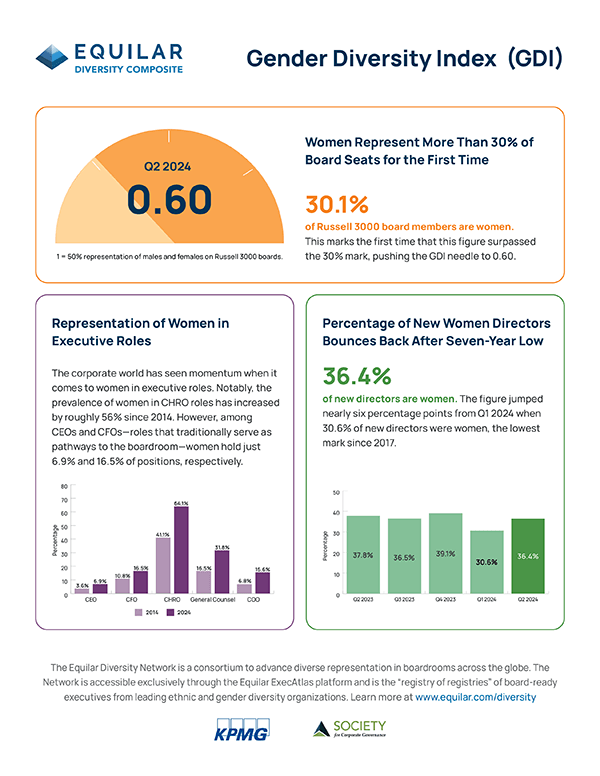Q2 2024 Equilar Gender Diversity Index
Women Represent 30% of Russell 3000 Board Seats for the First Time
August 15, 2024
Amit Batish
The push for gender diversity on corporate boards reached a significant milestone during the second quarter of 2024. According to the Q2 2024 Equilar Gender Diversity Index (GDI), women now occupy 30.1% of all Russell 3000 board seats, marking the first time ever that women represent at least 30% of directorships. The GDI now sits at 0.60, where 1.0 represents gender parity between men and women across the Russell 3000.

Exactly five years ago, the Russell 3000 surpassed 20% representation, signaling the first major milestone in the path to gender parity. And while the change in female representation from Q1 to Q2 marks just a 1.5% increase, experts state that reaching 30% is worth acknowledging.
“Achieving 30% in the Russell 3000 is a milestone to celebrate!” said Susan Angele, Senior Advisor at KPMG’s Board Leadership Center. “30% is known to be an inflection point at which members of under-represented groups are less likely to be perceived as tokens and more likely to be seen and heard as individuals. In the early 2010s, women held just over 10% of board seats. The numbers grew as the business environment became more complex and stakeholders, including the investor-driven 30% Coalition, championed the value of diversity.”
A large part of what drives the prevalence of women on corporate boards of directors is the rate at which new appointments are women. During the second quarter of the year, 36.4% of new Russell board members were women. This marks an 18.8% increase from the first quarter when just 30.6% of new appointments were women—the lowest point since 2017.
| Year |
New Directors Who Are Women |
| Q2 2023 |
37.8 |
| Q3 2023 |
36.5 |
| Q4 2023 |
39.1 |
| Q1 2024 |
30.6 |
| Q2 2024 |
36.4 |
The Q2 analysis also shows that 6.2% of boards have achieved gender parity—an increase from 5.7% during the previous quarter. Meanwhile, 2.1% of Russell 3000 boards do not have a board seat filled by a woman, up from 1.9% in Q1 2024.
Despite the Q2 milestone in boardroom representation, women continue to face significant challenges across the corporate landscape, particularly in C-level executive positions. Currently, women hold just 6.9% of CEO roles and 16.5% of CFO roles within the Russell 3000. Since 2014, the number of women in CEO and CFO roles has increased, but progress has been slow over the last ten years.
Given the fact that the CEO and CFO roles often serve as key pathways to board service, the lack of women in these positions can make it challenging for them to secure directorships. The one C-level role that has shown the most promise for women is the CHRO, in which women occupy 64.1% of positions—up from 41.1% in 2014.
“Boards can help their companies by sending a message that a strong management diversity strategy, throughout the organization and up into the C-suite, is good for business,” explained Angele.
| Executive Roles |
2014 |
2024 |
| CEO |
3.6 |
6.9 |
| CFO |
10.8 |
16.5 |
| CHRO |
41.1 |
64.1 |
| General Counsel |
16.5 |
31.8 |
| COO |
6.8 |
15.6 |
Achieving the 30% milestone is a significant victory for gender equality advocates looking to gain traction. Ultimately, it is up to individual companies and their boards to decide whether they will commit to advancing diversity, but Angele emphasizes the benefits for businesses. “Boards that recruit from pipelines that are diverse—in gender, race, ethnicity, sexual orientation and other aspects of diversity—add richness to the boardroom discussion and position themselves to guide their companies into the future.”
Only time will reveal the full impact of gender diversity on boards, but for now, advocates can celebrate this achievement.
About Equilar Gender Diversity Index
The Equilar GDI reflects changes on Russell 3000 boards on a quarterly basis as cited in 8-K filings to the SEC. Most indices that track information about board diversity do so annually or even less frequently, and typically with a smaller sample size, sometimes looking back more than a full year by the time the information is published. The Equilar GDI aims to capture the influence of the increasing calls for diversity from investors and other stakeholders in real time.
The Equilar GDI is powered by Equilar ExecAtlas, a database of board members and executives. ExecAtlas includes exclusive features that show how board members and companies are connected to each other, as well as the Equilar Diversity Network (EDN), a “registry of registries” of board-ready executives from leading ethnic and gender diversity partnerships, organizations, and publications.
Contact

Amit Batish
Senior Director of Content at Equilar
Amit Batish, Senior Director of Content at Equilar, authored this post. Equilar Researchers Sinem Atalay, Jeremy Ho, Erin Le, Lucia Song, Jake Teng, Laura Wu and Joyce Zhu contributed data and analysis. Please contact Amit Batish at abatish@equilar.com.
 Solutions
Solutions












